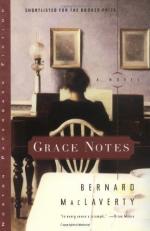|
This section contains 600 words (approx. 2 pages at 400 words per page) |

|
Grace Notes Summary & Study Guide Description
Grace Notes Summary & Study Guide includes comprehensive information and analysis to help you understand the book. This study guide contains the following sections:
This detailed literature summary also contains Topics for Discussion and a Free Quiz on Grace Notes by Bernard MacLaverty.
Grace Notes takes a poignant look at the life of a female composer whose life has begun to unravel. Short listed for the Booker prize, Grace Notes offers a look at the state of a depressed female mind in a male dominated profession. The novel is a moving exploration of music in the mind of an artist for whom music is her only salvation.
Catherine McKenna is a composer whose life seems to be unraveling. She is battling postpartum depression when she learns that her father has died of a heart attack. Now she must return to Ireland to comfort her mother and renegotiate the terms of their relationship. Since Catherine has been estranged from her parents for well over two years, she has not told them that she has a child. Her father dies never knowing he has a granddaughter, which adds further guilt to Catherine's already troubled mental state.
Catherine comforts her mother as best she can. She attends the funeral and burial of her father and accepts the condolences of friends and family. While in Ireland, Catherine visits with her first music teacher, Miss Bingham. She learns that Miss Bingham is dying, and Catherine is glad she got the chance to discuss music with her teacher one last time. Catherine also tells her mother about the baby and is met with a very poor reaction. Mrs. McKenna is shocked that her once good daughter is now a single mother with an illegitimate child. She cannot reconcile that her child would go against all that she was taught to believe. Catherine, for her part, tries to get her mother to understand that times are different and that a life like hers is not considered evil or wrong anymore. The two form an uneasy truce, and Mrs. McKenna offers to let Catherine and the baby move in with her if they want.
Catherine returns to Glasgow to find that her daughter has said her first word. She is so excited to see Anna that she does not put her down even to use the bathroom. Catherine, who has never been religious, experiences a spiritual joy at seeing and being with her child. Part 1 ends with the musical notation "Credo."
Part 2 begins with a still-pregnant Catherine contemplating music and procreation. She goes into labor and is flown to the hospital to give birth. Catherine's initial joy and excitement at giving birth to Anna are immediately eclipsed by a crushing depression. She is afraid that she will hurt Anna. She is afraid something will happen to Anna, and it will be her fault. She worries that she won't be a good mother because she doesn't love her child as much as she should.
Catherine has more to worry about. Her relationship with Anna's father Dave is falling apart quickly. He constantly drinks and is either leaving the house with a hangover or arriving at the house drunk and stumbling. After Anna is born, Dave becomes abusive. He hits Catherine on several occasions, always claiming to not remember doing so the next morning. It is not until he tries to break Catherine's fingers that Catherine works up the courage to leave him.
Catherine moves into the basement apartment of her friend Liz's house. There, she begins working on a commission for the BBC's Cutting Edge series. The piece is Vernicle, a title she takes from Chaucer's Canterbury Tales. Vernicle is unique in that Catherine is Roman Catholic but heavily uses Protestant drums in the music. The composition is a complete success and goes out live over the radio.
Read more from the Study Guide
|
This section contains 600 words (approx. 2 pages at 400 words per page) |

|



